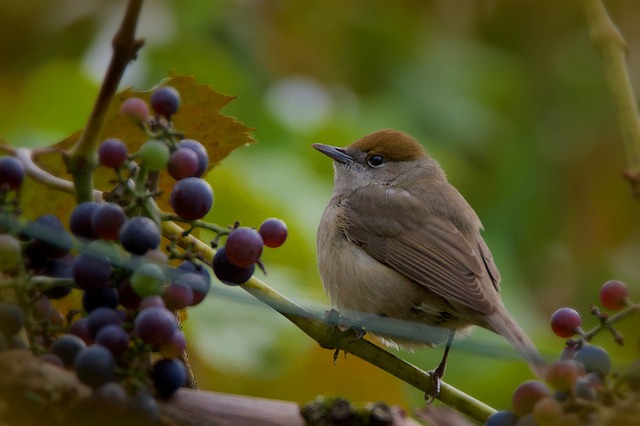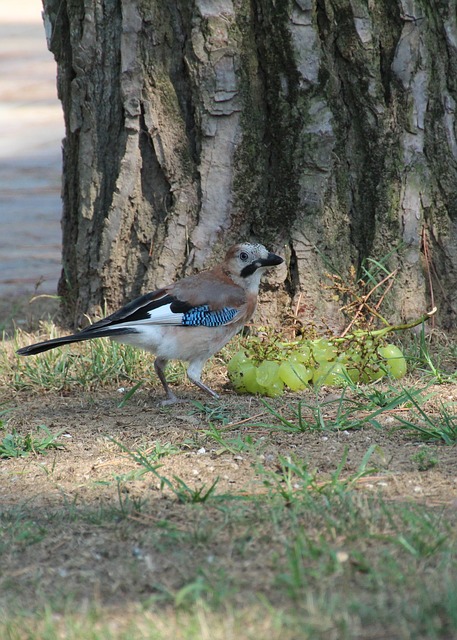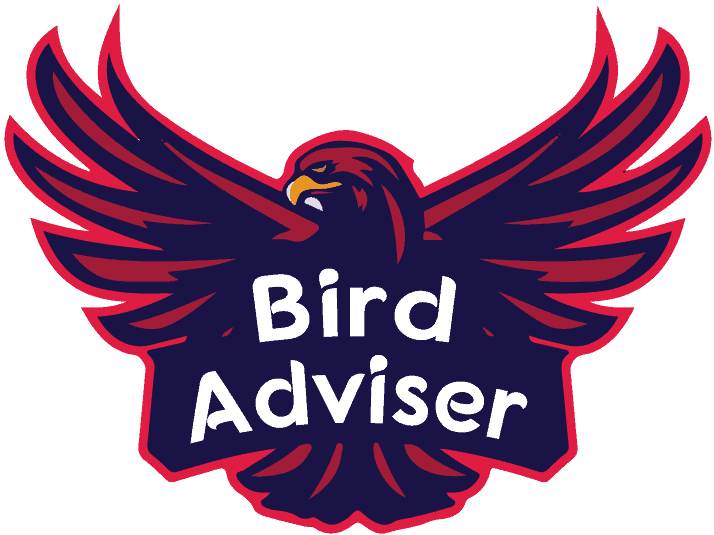Yes, Birds Can Eat Grapes. These sweet fruits can be a beneficial addition to their diet.
Grapes provide a natural source of sugars that can offer quick energy to birds, especially during times when other food sources might be scarce.
Birds like robins, thrushes, starlings, and pigeons are among those that may enjoy nibbling on grapes.
However, a few precautions should be taken.
It’s essential to provide seedless grapes to prevent any potential harm from seeds, and washing them thoroughly is important to remove any pesticides or contaminants.
To make consumption easier, cutting grapes into smaller pieces is recommended, as birds have relatively small beaks.
While grapes can be a tasty treat, it’s essential to remember that they should not constitute the primary portion of a bird’s diet.
Birds require a well-rounded diet that includes a variety of foods, such as seeds, insects, fruits, and more.
So, offering grapes as an occasional snack, in addition to their natural diet, can be a delightful way to attract and provide for the avian visitors in your area.

Is It Safe For Birds to Eat Grapes?
Grapes are very safe for your bird. They are neither poisonous nor dangerous to your bird.
Grapes are delicious and contain a significant amount of fructose, the fruit sugar.
The birds will gain weight if they are overfed by grapes.
Fructose also aids in providing rapid energy to your bird, but do not overfeed them for this purpose.
Aside from that, the only thing to be concerned about is the pesticide found in grapes.
To ensure that they are entirely free of pesticides, you must adequately wash them.
Because grapes have a waxy covering and pesticides on them, it’s a good idea to massage them with a fruit wash solution.
Grapes Nutritional Values
| Calories | 104 grams |
| Protein | 1.1 grams |
| Carbs | 27.3 grams |
| Fat | 0.2 grams |
| Fiber | 1.4 grams |
| Sodium | 5% of the Reference Daily Intake (RDI) |
| Copper | 10% of the RDI |
| Riboflavin | 5% of the RDI |
| Vitamin C | 27% of the RDI |
| Vitamin K | 28% of the RDI |
| Manganese | 5% of the RDI |
| Thiamine | 7% of the RDI |
Source: Healthline
Pros and Cons of Grapes for Birds
1. Vitamin K and Vitamin C
Vitamin K, a fat-soluble vitamin essential for blood clotting and bone health, is found in more than a quarter of a cup (151 grams) of grapes.
Vitamin C, a vital nutrient and potent antioxidant for connective tissue health is also abundant in them.
2. Booster of Immunity
According to research published in the journal National Library of Medicine, red grape resveratrol may work in tandem with vitamin D to boost the activity of the human cathelicidin antimicrobial peptide, or CAMP gene, which is critical for immune function.
3. Anti-nutrients
Anti-nutrients in grapes prevent your body from absorbing certain minerals.
Phytic acid, a molecule that binds to iron, zinc, magnesium, and calcium and hinders their absorption, is abundant in grapes.
4. Enriched Vitamins and Minerals
Essential nutrients such as protein, fiber, vitamins, and minerals are generally lacking in grapes.
On the other hand, some types are fortified with additional micronutrients to increase their nutritional value and avoid deficits.
Iron, riboflavin, thiamine, and niacin are some of the frequent substances present in grapes.
Can Wild Birds Eat Grapes?

Yes, wild birds, such as parrots, can consume grapes. They are entirely safe for any wild bird to eat.
Offer grapes in moderation, though, because of the high sugar content.
It’s just as vital to look after the nutrition of wild birds as it is for garden birds.
As a result, only add grapes as a treat to your bird’s diet Grapes should never be given to kids daily.
A broad range of wild animals enjoys fruit.
Grapes also serve to improve the vigor of the parrot, just like they do for other birds.
What Types Of Birds Consume Grapes?
The blackbird, on the other hand, is an outlier.
They adore grapes and must be the misery of any vineyard owner’s existence in the United Kingdom.
They love ripe grapes, so harvesting the vines must be a race against time.
Blackbirds will congregate wherever grapes are grown, whether in the wild or the garden.
Grapes are enjoyed by both blue and coal tits, but if peanuts are available, they will always take them first.
Birds that eat grapes include woodpeckers, bluebirds, catbirds, grosbeaks, tanagers, and robins.
Not only that, but grapes are also eaten by several common British birds such as blackbirds, thrushes, and tits.
Grapes Are Beneficial to Birds

Grapes offer several advantages since they are high in healthy minerals and vitamins.
Grapes offer cancer-fighting qualities.
They also aid in the improvement of immunity.
Red grapes contain resveratrol, an antioxidant that boosts gene activity, resulting in improved immune system performance.
Resveratrol must collaborate with vitamin D to do this.
Potassium levels are pretty high in them.
Potassium helps to manage the detrimental effects of salt by decreasing blood pressure and avoiding heart disease in your bird.
Grapes are low in sodium and assist the bird’s body in maintaining a healthy electrolyte balance.
They also aid in the elimination of extra toxins and water.
Grapes include polyphenols and carotenoids, which act as antioxidants.
These antioxidants also aid in the fight against several types of cancer cells and improve the condition of the bird’s heart by raising HDL levels while lowering blood inflammation.
Aside from that, dark-skinned grapes contain significant levels of antioxidants such as flavonoids, anthocyanins, and stilbenes.
They aid in the prevention of artery hardening (atherosclerosis) and the reduction of cancer-causing cells and tumors.
Because the bulk of antioxidants is found in the skin and seeds of grapes, give your bird the entire grape without removing anything.
Grapes can also help you take care of your bird’s eye.
Grapes help the retina produce a lower quantity of inflammatory proteins and a higher number of protective proteins.
The photoreceptors that respond to light are found in the retina, a component of the eye.
How to Choose Grapes for Birds?
Birds aren’t picky about grape varieties or colors. Grapes, both red and white, are edible to them.
Grapes are a favorite food of birds.
You can split Grapes in half, but the difficulty is that they decay rapidly.
Detach each grape from the stem and begin washing with grapes from your garden or the market.
In the summer, don’t put all the grapes in the bird feeder at once.
They’ll start to deteriorate, so you may add more once the first batch has been eaten.
How to Feed Grapes to Birds?
Birds usually don’t care what color grapes are; they’ll eat either red or white.
They adore the juicy, refreshing flavor and prefer them intact.
Cutting one in half may initially attract the bird, but it will shortly decay.
Wash the grapes after removing them from the stalk.
Put out only a handful at a time, especially in hot weather, because they spoil rapidly.
If the initial batch is quickly consumed, it is simple to add more.
If you don’t have a feeding table, you can use a peanut feeder to hang grapes.
The grapes are easily accessible for most birds because of the wire mesh.
You may sprinkle some on the ground for ground-feeding birds, but remember that grapes are poisonous to dogs, so make sure your canine is safe.
Most garden birds will give the grapes a smell but leave them if there are well-stocked feeders nearby.
I recommend only using grapes when there is nothing else available.
As a result, the bird will receive a nutritious and healthful treat that may help relieve his thirst.
Alternative to Grapes for Birds
- Berries – Blueberries, Strawberries, Raspberries, and Blackberries
- Apple
- Oranges
- Melons – Watermelon, Cantaloupe
- Bananas
- Seed Mixes
- Nuts
- Insects
- Suet
- Flowers and Plants
If you have a Parakeet or Cockatiel then check this article on Can Parakeets Eat Grapes? or Can Cockatiel Eat Grapes?
Conclusion
In conclusion, the question of whether birds can eat grapes is answered with a resounding “Yes”.
Grapes, when offered in moderation and with proper precautions, can be a delightful addition to the diet of various bird species.
Their natural sugars provide a quick energy boost, especially when other food sources might be limited.
However, it’s crucial to ensure that grapes are seedless and thoroughly washed to avoid any potential harm from seeds or pesticides.
Cutting grapes into smaller pieces makes them easier for birds to consume.
Yet, while grapes can be a tasty treat, they should be just one part of a well-rounded diet.
Birds require a diverse range of foods, including seeds, insects, fruits, and more, to meet their nutritional needs fully.
By offering grapes alongside other bird-friendly foods, you’re not only creating an enticing feeding station but also contributing to the well-being of your feathered visitors.
So, embrace the joy of watching birds relish these occasional treats while maintaining a thoughtful and varied approach to their nutritional requirements.
FAQ
Which birds can eat grapes?
Birds such as robins, thrushes, starlings, pigeons, and others are known to enjoy grapes as part of their diet.
Are grapes safe for birds?
Grapes can be safe for birds if offered correctly. Seedless grapes that are thoroughly washed to remove pesticides and contaminants are recommended.
Do I need to prepare grapes in a specific way for birds?
To make grapes easier for birds to consume, cutting them into smaller pieces is advisable. This is because birds have small beaks that may struggle with larger pieces.
Can grapes be a main part of a bird's diet?
Grapes should not be the main component of a bird’s diet. Birds require a varied and balanced diet that includes seeds, insects, fruits, and other foods to meet their nutritional needs.
Can birds eat grapes with seeds?
It’s recommended to provide seedless grapes to birds. Seeds could potentially be harmful if ingested.
Last Updated on August 29, 2023 by Lily Aldrin
